Investigating the Cognitive Effects of Google's Influence: An Essay
VerifiedAdded on 2021/04/21
|6
|1242
|153
Essay
AI Summary
This essay delves into the controversial question of whether Google and the internet are negatively impacting human cognition. Drawing upon quotes and ideas from Nicholas Carr's essay, "Is Google Making Us Stupid?", the student explores the potential effects of readily available information on reading habits, attention spans, and memory retention. The essay examines the perspectives of various experts, including Lewis Mumford, Bruce Friedman, Maryanne Wolf, James Olds, and Joseph Weizenbaum, to analyze how the brain adapts to the digital environment. It discusses the shift from deep reading to skimming, the impact of information overload, and the potential for technology to alter our cognitive abilities. The essay also touches upon the historical context of technological change and its influence on human behavior, ultimately aiming to provide a comprehensive overview of the complex relationship between technology and the human mind.
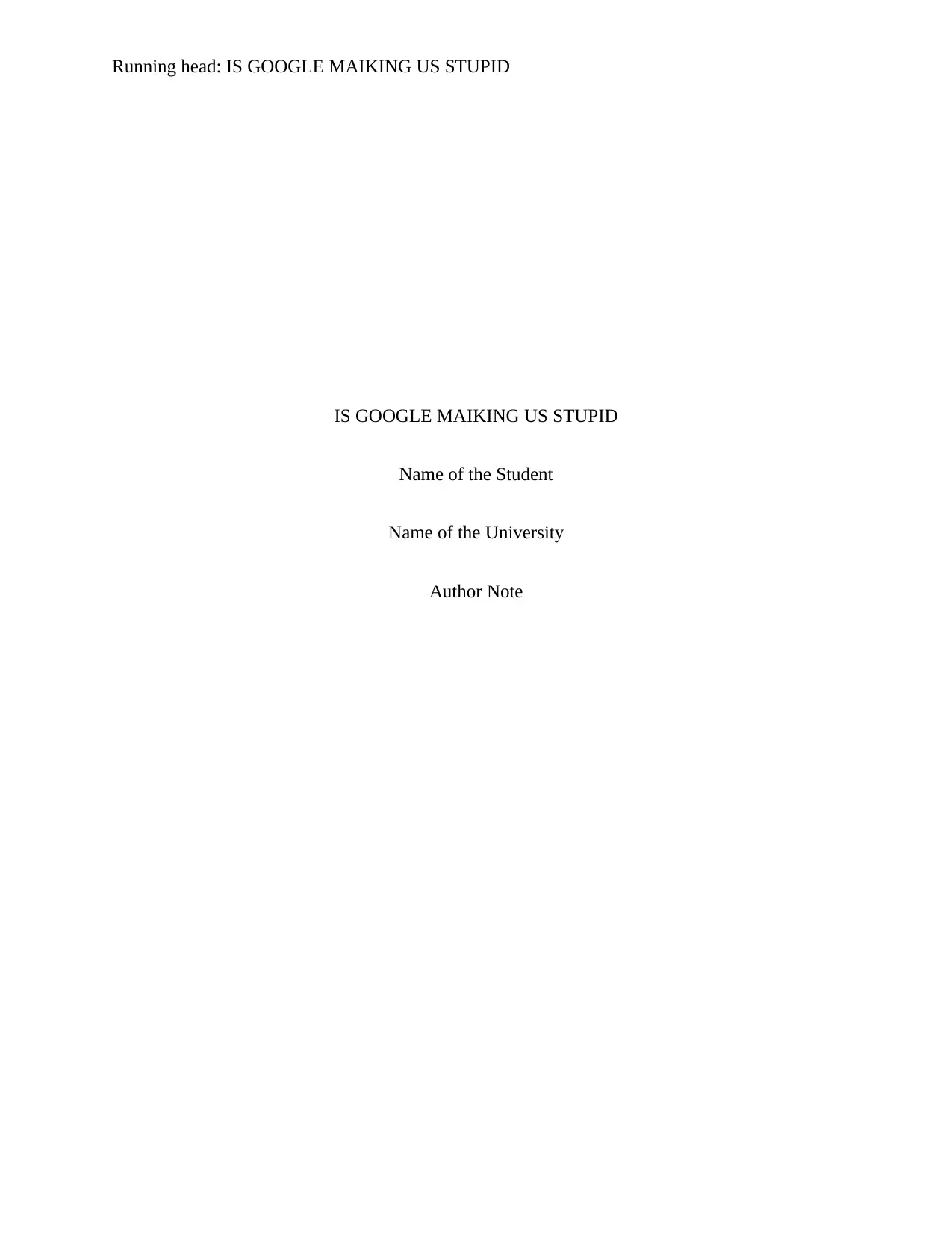
Running head: IS GOOGLE MAIKING US STUPID
IS GOOGLE MAIKING US STUPID
Name of the Student
Name of the University
Author Note
IS GOOGLE MAIKING US STUPID
Name of the Student
Name of the University
Author Note
Paraphrase This Document
Need a fresh take? Get an instant paraphrase of this document with our AI Paraphraser
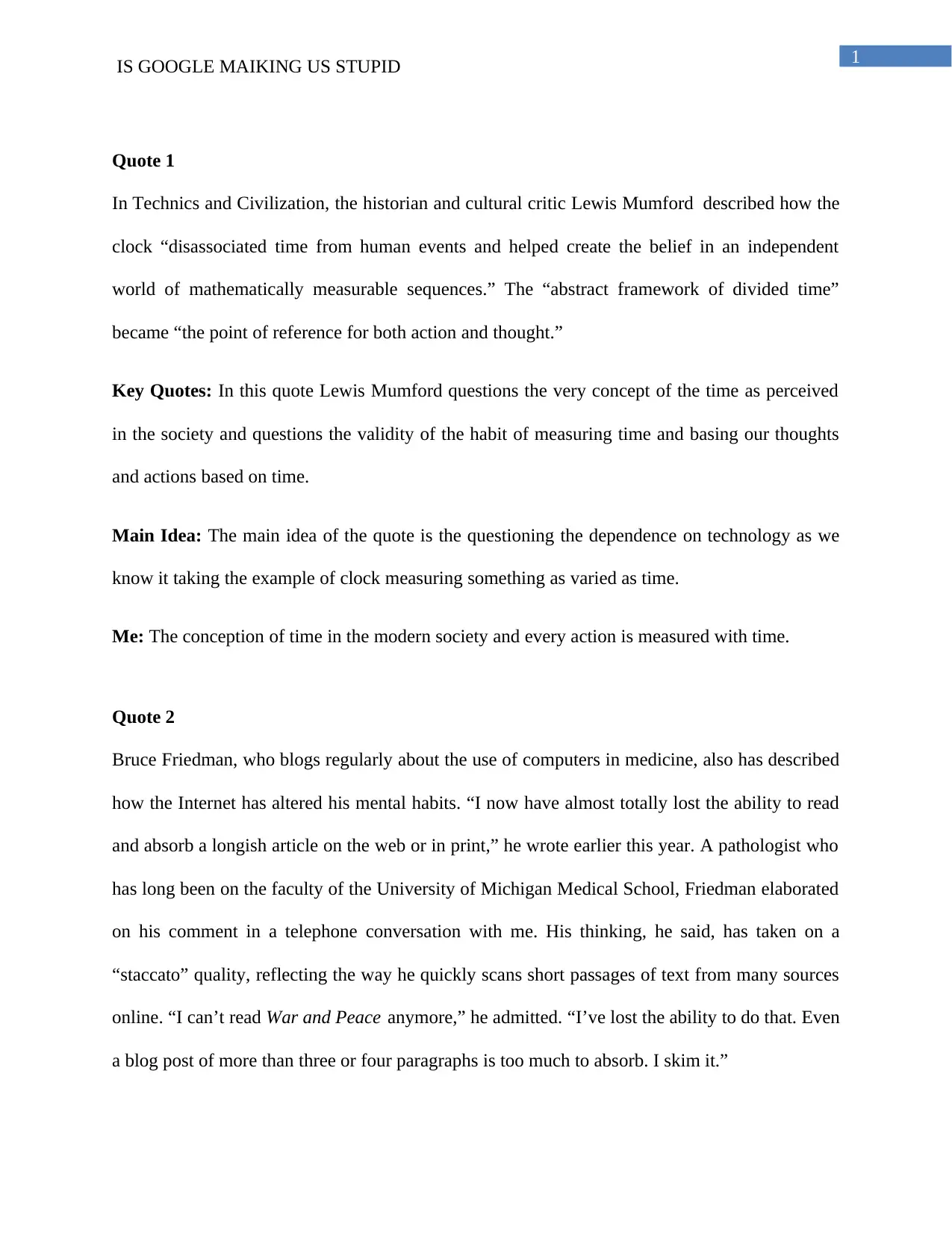
1
IS GOOGLE MAIKING US STUPID
Quote 1
In Technics and Civilization, the historian and cultural critic Lewis Mumford described how the
clock “disassociated time from human events and helped create the belief in an independent
world of mathematically measurable sequences.” The “abstract framework of divided time”
became “the point of reference for both action and thought.”
Key Quotes: In this quote Lewis Mumford questions the very concept of the time as perceived
in the society and questions the validity of the habit of measuring time and basing our thoughts
and actions based on time.
Main Idea: The main idea of the quote is the questioning the dependence on technology as we
know it taking the example of clock measuring something as varied as time.
Me: The conception of time in the modern society and every action is measured with time.
Quote 2
Bruce Friedman, who blogs regularly about the use of computers in medicine, also has described
how the Internet has altered his mental habits. “I now have almost totally lost the ability to read
and absorb a longish article on the web or in print,” he wrote earlier this year. A pathologist who
has long been on the faculty of the University of Michigan Medical School, Friedman elaborated
on his comment in a telephone conversation with me. His thinking, he said, has taken on a
“staccato” quality, reflecting the way he quickly scans short passages of text from many sources
online. “I can’t read War and Peace anymore,” he admitted. “I’ve lost the ability to do that. Even
a blog post of more than three or four paragraphs is too much to absorb. I skim it.”
IS GOOGLE MAIKING US STUPID
Quote 1
In Technics and Civilization, the historian and cultural critic Lewis Mumford described how the
clock “disassociated time from human events and helped create the belief in an independent
world of mathematically measurable sequences.” The “abstract framework of divided time”
became “the point of reference for both action and thought.”
Key Quotes: In this quote Lewis Mumford questions the very concept of the time as perceived
in the society and questions the validity of the habit of measuring time and basing our thoughts
and actions based on time.
Main Idea: The main idea of the quote is the questioning the dependence on technology as we
know it taking the example of clock measuring something as varied as time.
Me: The conception of time in the modern society and every action is measured with time.
Quote 2
Bruce Friedman, who blogs regularly about the use of computers in medicine, also has described
how the Internet has altered his mental habits. “I now have almost totally lost the ability to read
and absorb a longish article on the web or in print,” he wrote earlier this year. A pathologist who
has long been on the faculty of the University of Michigan Medical School, Friedman elaborated
on his comment in a telephone conversation with me. His thinking, he said, has taken on a
“staccato” quality, reflecting the way he quickly scans short passages of text from many sources
online. “I can’t read War and Peace anymore,” he admitted. “I’ve lost the ability to do that. Even
a blog post of more than three or four paragraphs is too much to absorb. I skim it.”
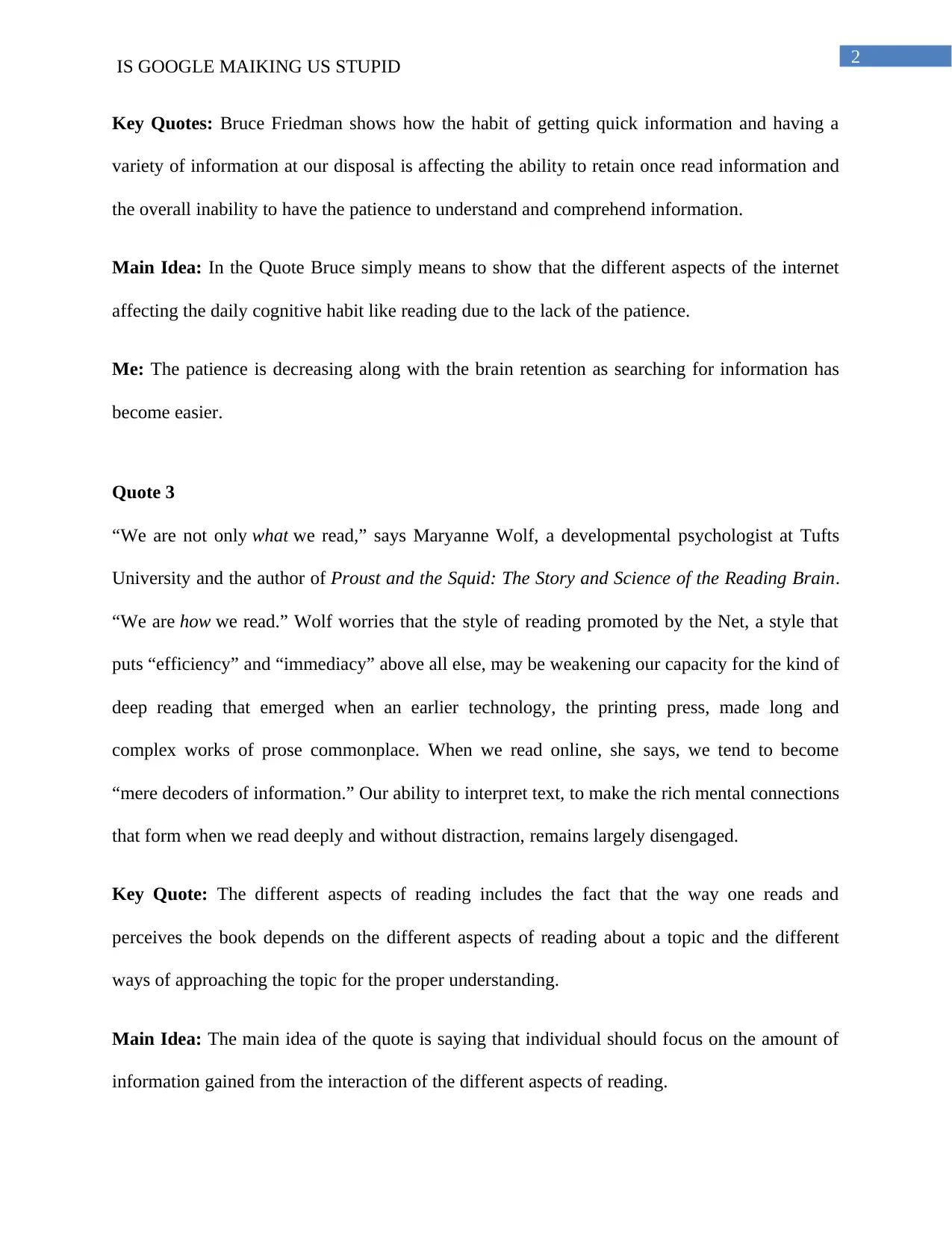
2
IS GOOGLE MAIKING US STUPID
Key Quotes: Bruce Friedman shows how the habit of getting quick information and having a
variety of information at our disposal is affecting the ability to retain once read information and
the overall inability to have the patience to understand and comprehend information.
Main Idea: In the Quote Bruce simply means to show that the different aspects of the internet
affecting the daily cognitive habit like reading due to the lack of the patience.
Me: The patience is decreasing along with the brain retention as searching for information has
become easier.
Quote 3
“We are not only what we read,” says Maryanne Wolf, a developmental psychologist at Tufts
University and the author of Proust and the Squid: The Story and Science of the Reading Brain.
“We are how we read.” Wolf worries that the style of reading promoted by the Net, a style that
puts “efficiency” and “immediacy” above all else, may be weakening our capacity for the kind of
deep reading that emerged when an earlier technology, the printing press, made long and
complex works of prose commonplace. When we read online, she says, we tend to become
“mere decoders of information.” Our ability to interpret text, to make the rich mental connections
that form when we read deeply and without distraction, remains largely disengaged.
Key Quote: The different aspects of reading includes the fact that the way one reads and
perceives the book depends on the different aspects of reading about a topic and the different
ways of approaching the topic for the proper understanding.
Main Idea: The main idea of the quote is saying that individual should focus on the amount of
information gained from the interaction of the different aspects of reading.
IS GOOGLE MAIKING US STUPID
Key Quotes: Bruce Friedman shows how the habit of getting quick information and having a
variety of information at our disposal is affecting the ability to retain once read information and
the overall inability to have the patience to understand and comprehend information.
Main Idea: In the Quote Bruce simply means to show that the different aspects of the internet
affecting the daily cognitive habit like reading due to the lack of the patience.
Me: The patience is decreasing along with the brain retention as searching for information has
become easier.
Quote 3
“We are not only what we read,” says Maryanne Wolf, a developmental psychologist at Tufts
University and the author of Proust and the Squid: The Story and Science of the Reading Brain.
“We are how we read.” Wolf worries that the style of reading promoted by the Net, a style that
puts “efficiency” and “immediacy” above all else, may be weakening our capacity for the kind of
deep reading that emerged when an earlier technology, the printing press, made long and
complex works of prose commonplace. When we read online, she says, we tend to become
“mere decoders of information.” Our ability to interpret text, to make the rich mental connections
that form when we read deeply and without distraction, remains largely disengaged.
Key Quote: The different aspects of reading includes the fact that the way one reads and
perceives the book depends on the different aspects of reading about a topic and the different
ways of approaching the topic for the proper understanding.
Main Idea: The main idea of the quote is saying that individual should focus on the amount of
information gained from the interaction of the different aspects of reading.
⊘ This is a preview!⊘
Do you want full access?
Subscribe today to unlock all pages.

Trusted by 1+ million students worldwide
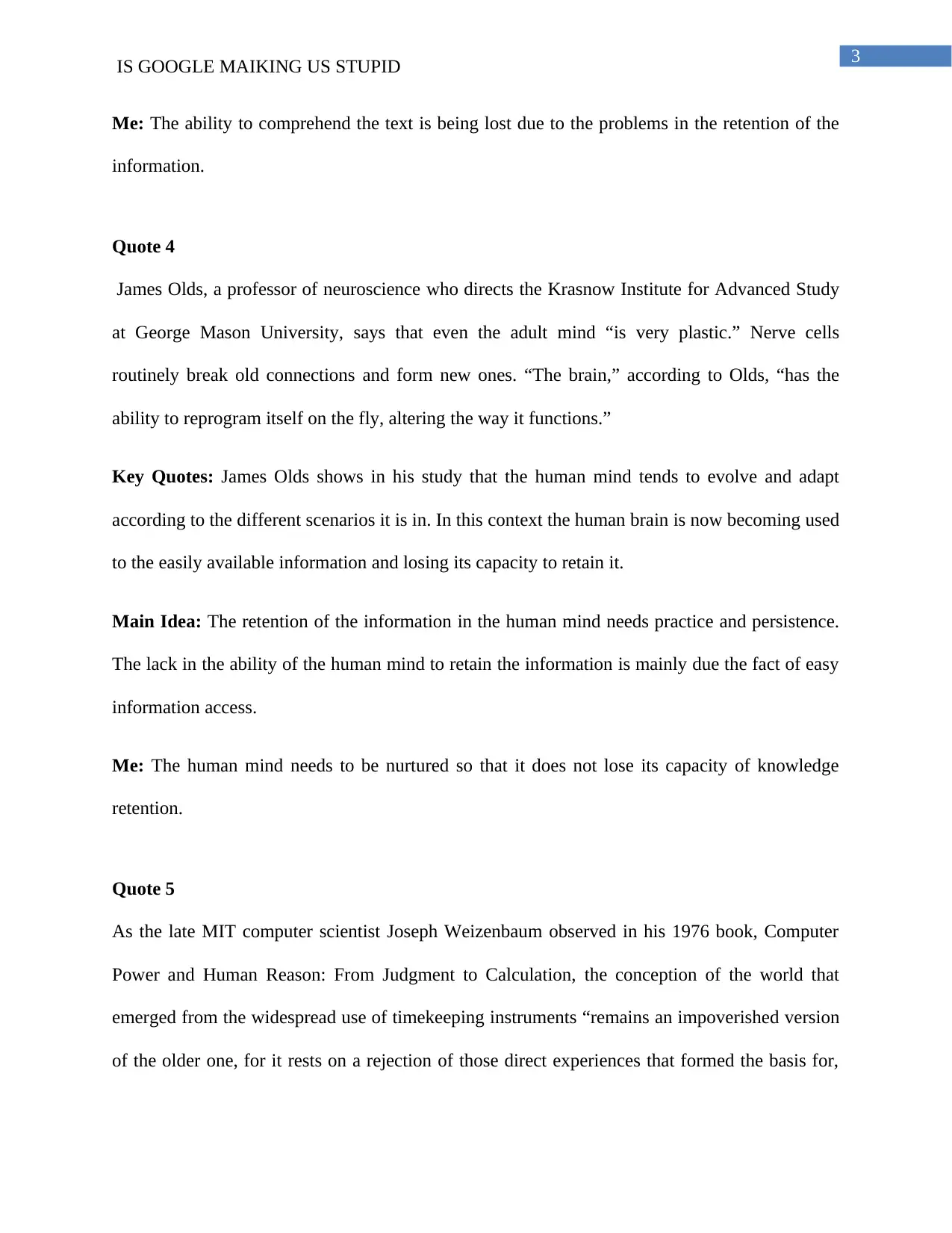
3
IS GOOGLE MAIKING US STUPID
Me: The ability to comprehend the text is being lost due to the problems in the retention of the
information.
Quote 4
James Olds, a professor of neuroscience who directs the Krasnow Institute for Advanced Study
at George Mason University, says that even the adult mind “is very plastic.” Nerve cells
routinely break old connections and form new ones. “The brain,” according to Olds, “has the
ability to reprogram itself on the fly, altering the way it functions.”
Key Quotes: James Olds shows in his study that the human mind tends to evolve and adapt
according to the different scenarios it is in. In this context the human brain is now becoming used
to the easily available information and losing its capacity to retain it.
Main Idea: The retention of the information in the human mind needs practice and persistence.
The lack in the ability of the human mind to retain the information is mainly due the fact of easy
information access.
Me: The human mind needs to be nurtured so that it does not lose its capacity of knowledge
retention.
Quote 5
As the late MIT computer scientist Joseph Weizenbaum observed in his 1976 book, Computer
Power and Human Reason: From Judgment to Calculation, the conception of the world that
emerged from the widespread use of timekeeping instruments “remains an impoverished version
of the older one, for it rests on a rejection of those direct experiences that formed the basis for,
IS GOOGLE MAIKING US STUPID
Me: The ability to comprehend the text is being lost due to the problems in the retention of the
information.
Quote 4
James Olds, a professor of neuroscience who directs the Krasnow Institute for Advanced Study
at George Mason University, says that even the adult mind “is very plastic.” Nerve cells
routinely break old connections and form new ones. “The brain,” according to Olds, “has the
ability to reprogram itself on the fly, altering the way it functions.”
Key Quotes: James Olds shows in his study that the human mind tends to evolve and adapt
according to the different scenarios it is in. In this context the human brain is now becoming used
to the easily available information and losing its capacity to retain it.
Main Idea: The retention of the information in the human mind needs practice and persistence.
The lack in the ability of the human mind to retain the information is mainly due the fact of easy
information access.
Me: The human mind needs to be nurtured so that it does not lose its capacity of knowledge
retention.
Quote 5
As the late MIT computer scientist Joseph Weizenbaum observed in his 1976 book, Computer
Power and Human Reason: From Judgment to Calculation, the conception of the world that
emerged from the widespread use of timekeeping instruments “remains an impoverished version
of the older one, for it rests on a rejection of those direct experiences that formed the basis for,
Paraphrase This Document
Need a fresh take? Get an instant paraphrase of this document with our AI Paraphraser
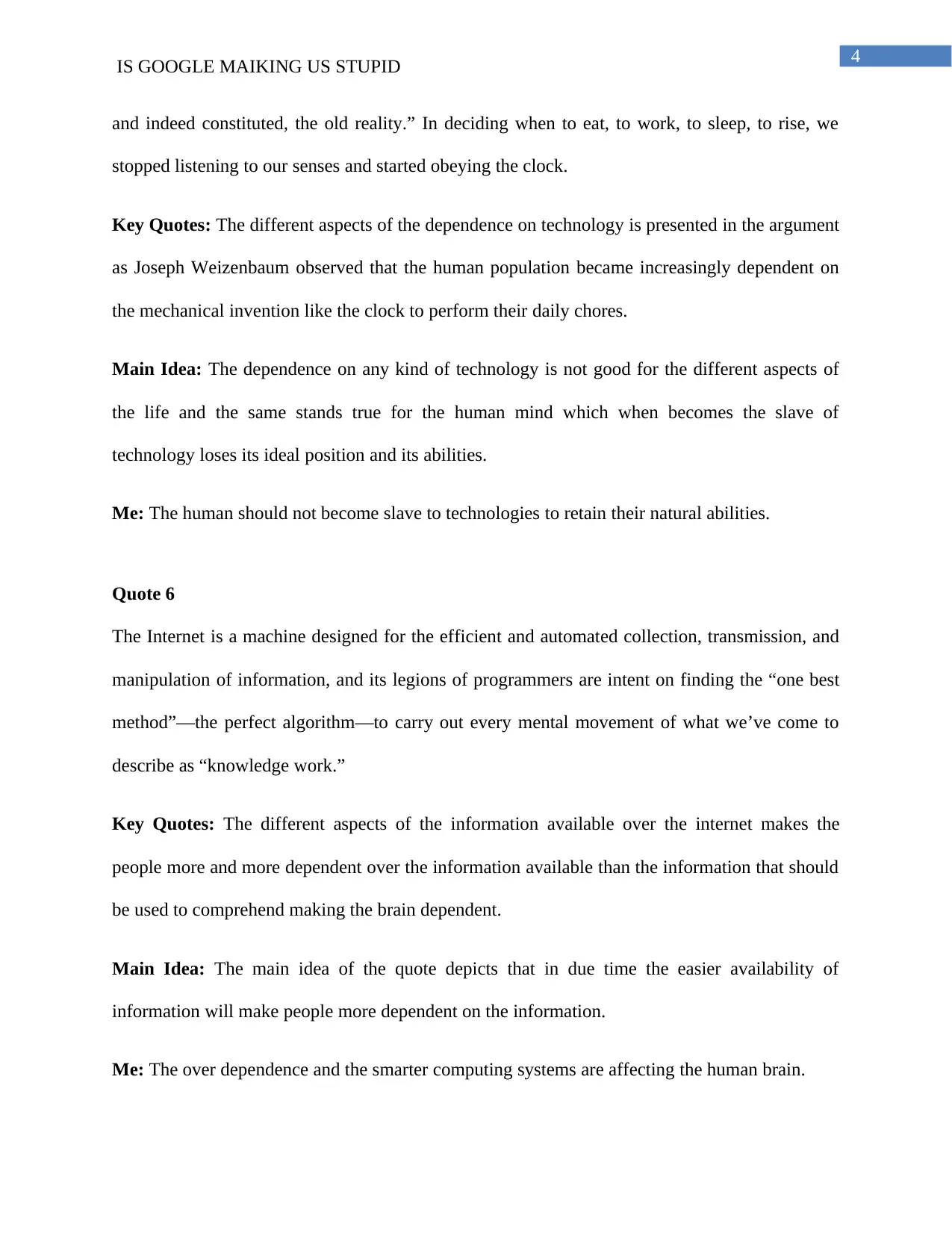
4
IS GOOGLE MAIKING US STUPID
and indeed constituted, the old reality.” In deciding when to eat, to work, to sleep, to rise, we
stopped listening to our senses and started obeying the clock.
Key Quotes: The different aspects of the dependence on technology is presented in the argument
as Joseph Weizenbaum observed that the human population became increasingly dependent on
the mechanical invention like the clock to perform their daily chores.
Main Idea: The dependence on any kind of technology is not good for the different aspects of
the life and the same stands true for the human mind which when becomes the slave of
technology loses its ideal position and its abilities.
Me: The human should not become slave to technologies to retain their natural abilities.
Quote 6
The Internet is a machine designed for the efficient and automated collection, transmission, and
manipulation of information, and its legions of programmers are intent on finding the “one best
method”—the perfect algorithm—to carry out every mental movement of what we’ve come to
describe as “knowledge work.”
Key Quotes: The different aspects of the information available over the internet makes the
people more and more dependent over the information available than the information that should
be used to comprehend making the brain dependent.
Main Idea: The main idea of the quote depicts that in due time the easier availability of
information will make people more dependent on the information.
Me: The over dependence and the smarter computing systems are affecting the human brain.
IS GOOGLE MAIKING US STUPID
and indeed constituted, the old reality.” In deciding when to eat, to work, to sleep, to rise, we
stopped listening to our senses and started obeying the clock.
Key Quotes: The different aspects of the dependence on technology is presented in the argument
as Joseph Weizenbaum observed that the human population became increasingly dependent on
the mechanical invention like the clock to perform their daily chores.
Main Idea: The dependence on any kind of technology is not good for the different aspects of
the life and the same stands true for the human mind which when becomes the slave of
technology loses its ideal position and its abilities.
Me: The human should not become slave to technologies to retain their natural abilities.
Quote 6
The Internet is a machine designed for the efficient and automated collection, transmission, and
manipulation of information, and its legions of programmers are intent on finding the “one best
method”—the perfect algorithm—to carry out every mental movement of what we’ve come to
describe as “knowledge work.”
Key Quotes: The different aspects of the information available over the internet makes the
people more and more dependent over the information available than the information that should
be used to comprehend making the brain dependent.
Main Idea: The main idea of the quote depicts that in due time the easier availability of
information will make people more dependent on the information.
Me: The over dependence and the smarter computing systems are affecting the human brain.
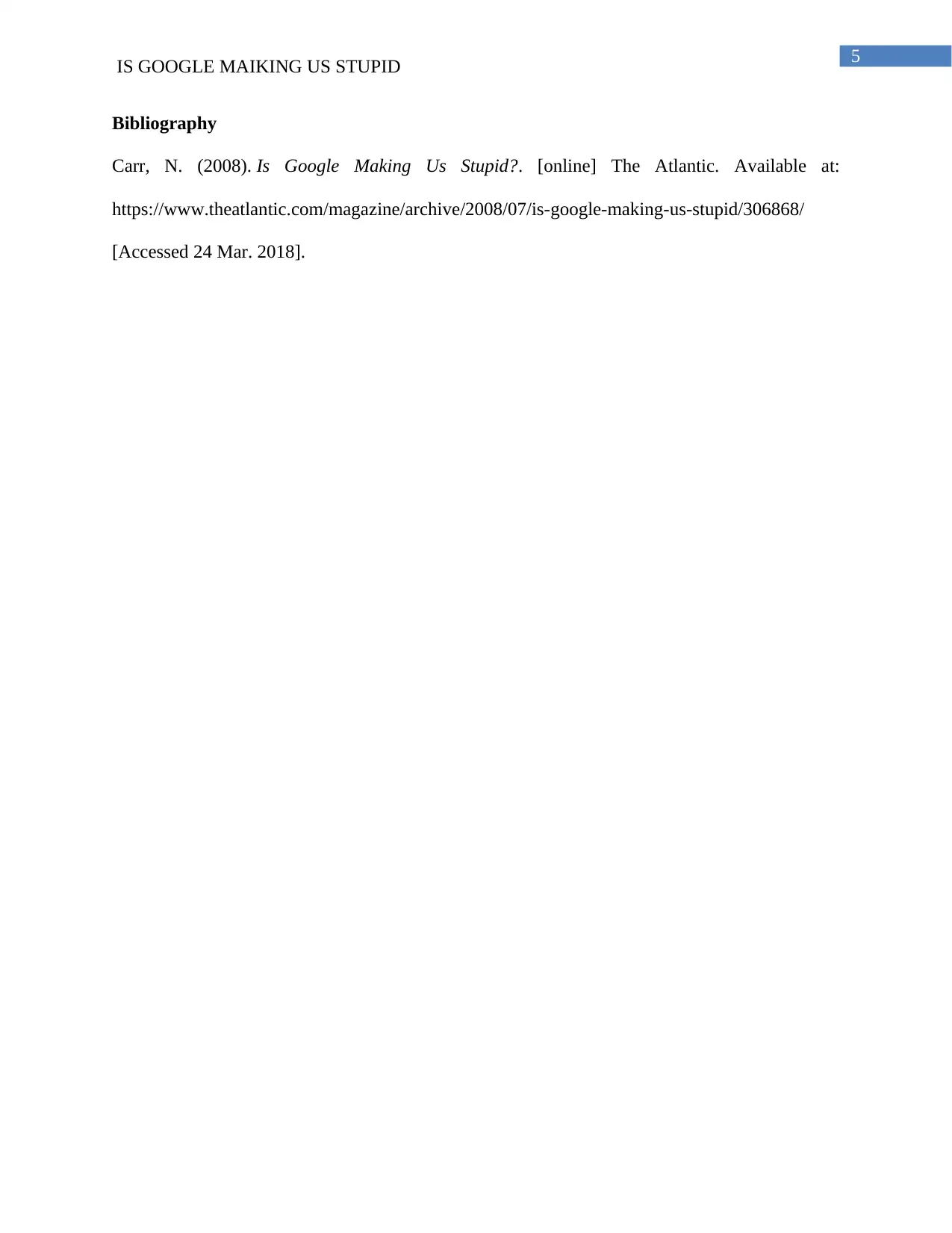
5
IS GOOGLE MAIKING US STUPID
Bibliography
Carr, N. (2008). Is Google Making Us Stupid?. [online] The Atlantic. Available at:
https://www.theatlantic.com/magazine/archive/2008/07/is-google-making-us-stupid/306868/
[Accessed 24 Mar. 2018].
IS GOOGLE MAIKING US STUPID
Bibliography
Carr, N. (2008). Is Google Making Us Stupid?. [online] The Atlantic. Available at:
https://www.theatlantic.com/magazine/archive/2008/07/is-google-making-us-stupid/306868/
[Accessed 24 Mar. 2018].
⊘ This is a preview!⊘
Do you want full access?
Subscribe today to unlock all pages.

Trusted by 1+ million students worldwide
1 out of 6
Your All-in-One AI-Powered Toolkit for Academic Success.
+13062052269
info@desklib.com
Available 24*7 on WhatsApp / Email
![[object Object]](/_next/static/media/star-bottom.7253800d.svg)
Unlock your academic potential
Copyright © 2020–2026 A2Z Services. All Rights Reserved. Developed and managed by ZUCOL.
